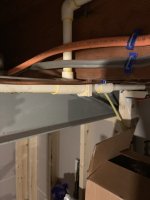Moved into house few months ago and prior to our purchase updates were made to plumbing/electrical. In unfinished part of basement I noticed areas where electrical wire was in contact or close to being in contact with CPVC, copper, and galvanized pipe. I fixed the wire near the copper line so there’s about a .75” gap between wire and copper above hot water heater but you’ll see in other picture the wire is in contact with the CPVC and galvanized pipe. I’ve read about there being issues with plasticizer in wire insulation that can weaken CPVC and cause it to leak over time, but admittedly don’t know enough about wiring. Not sure if it’s all wires or only certain wires like Ethernet/network wires? If possible to determine, might the ones in image have plasticizer potentially causing CPVC fatigue? Will try to adjust but wires are tight so wanted to check before I tried messing with them.
CPVC and wire plasticizer
- Thread starter bud6
- Start date

